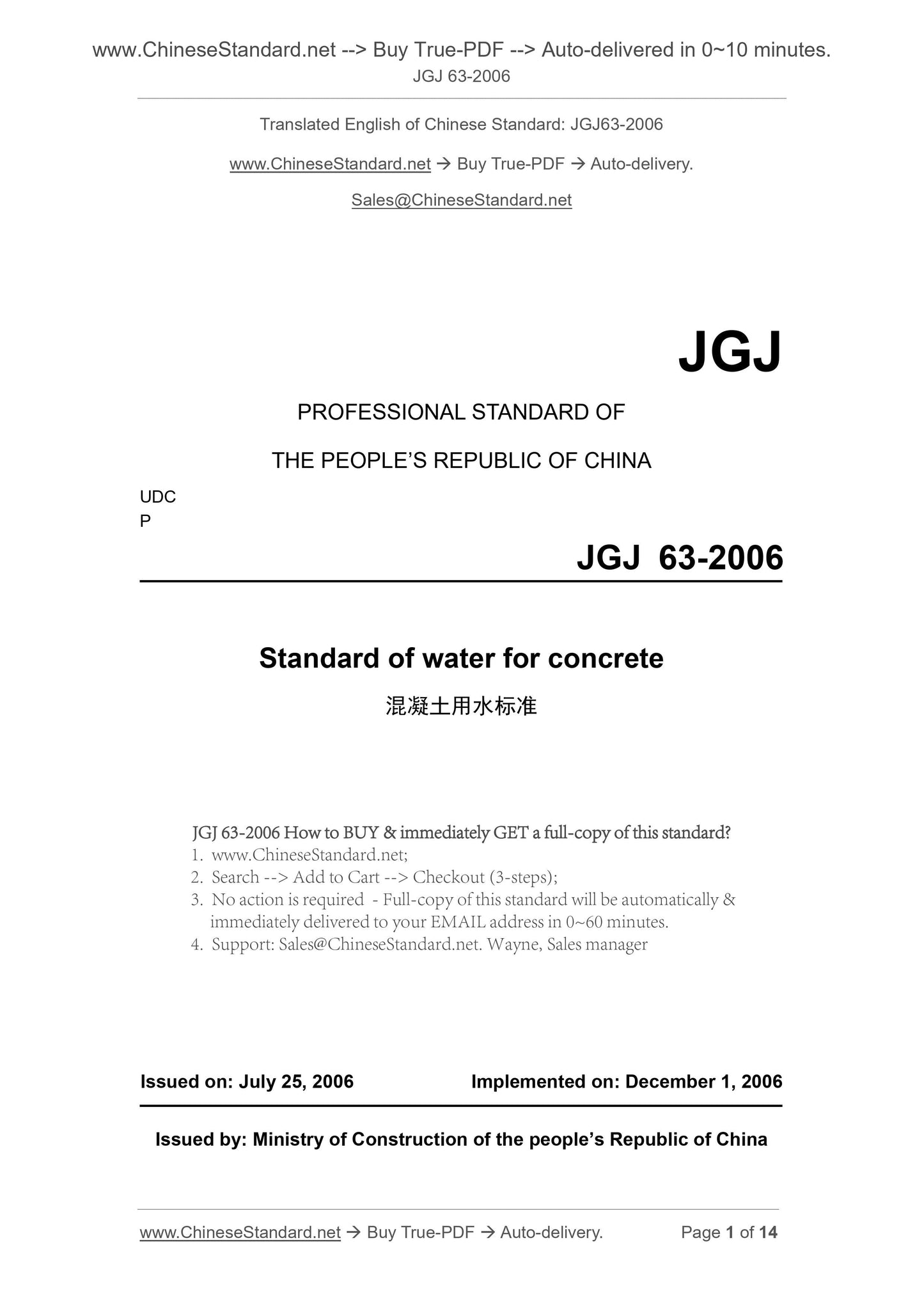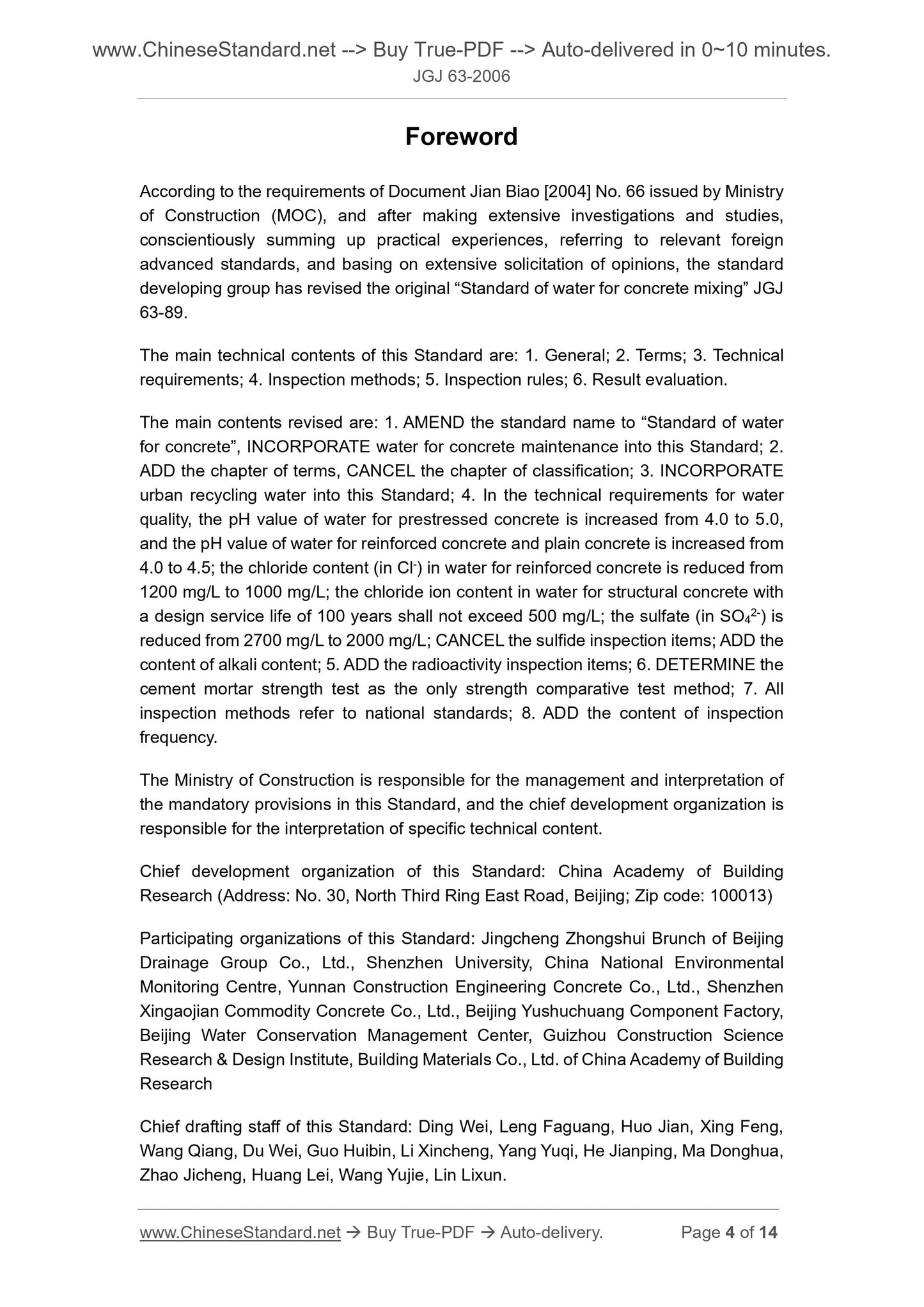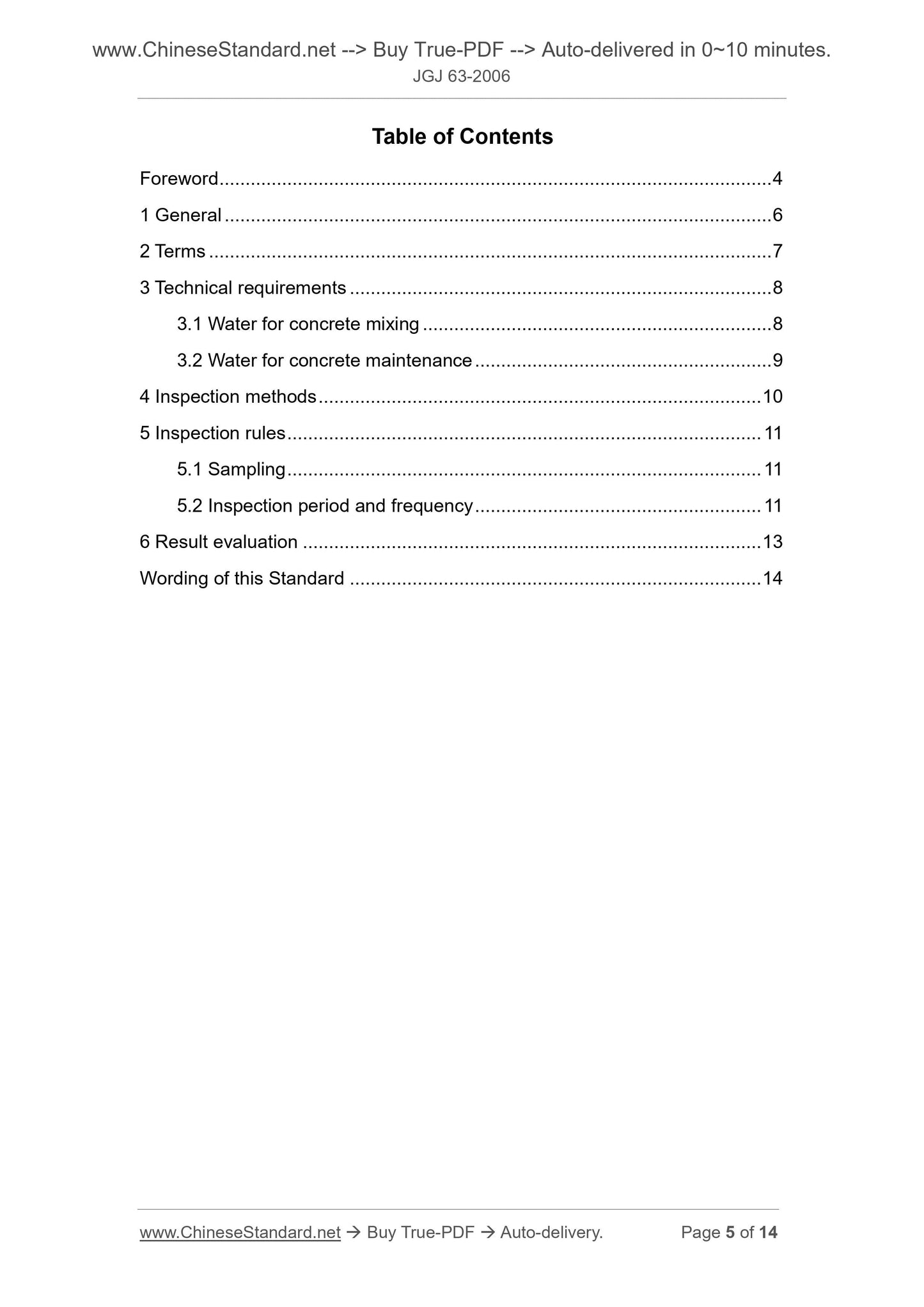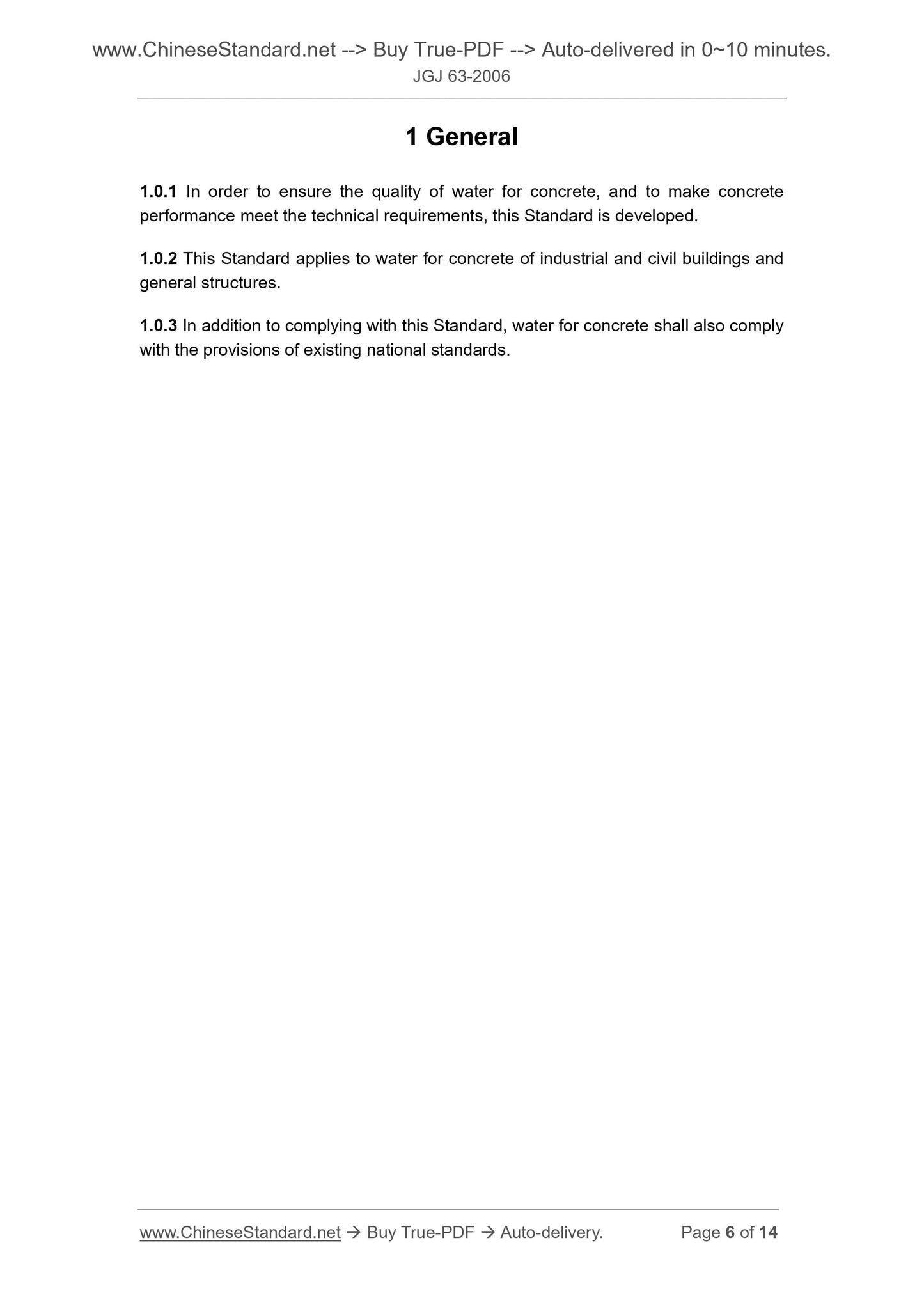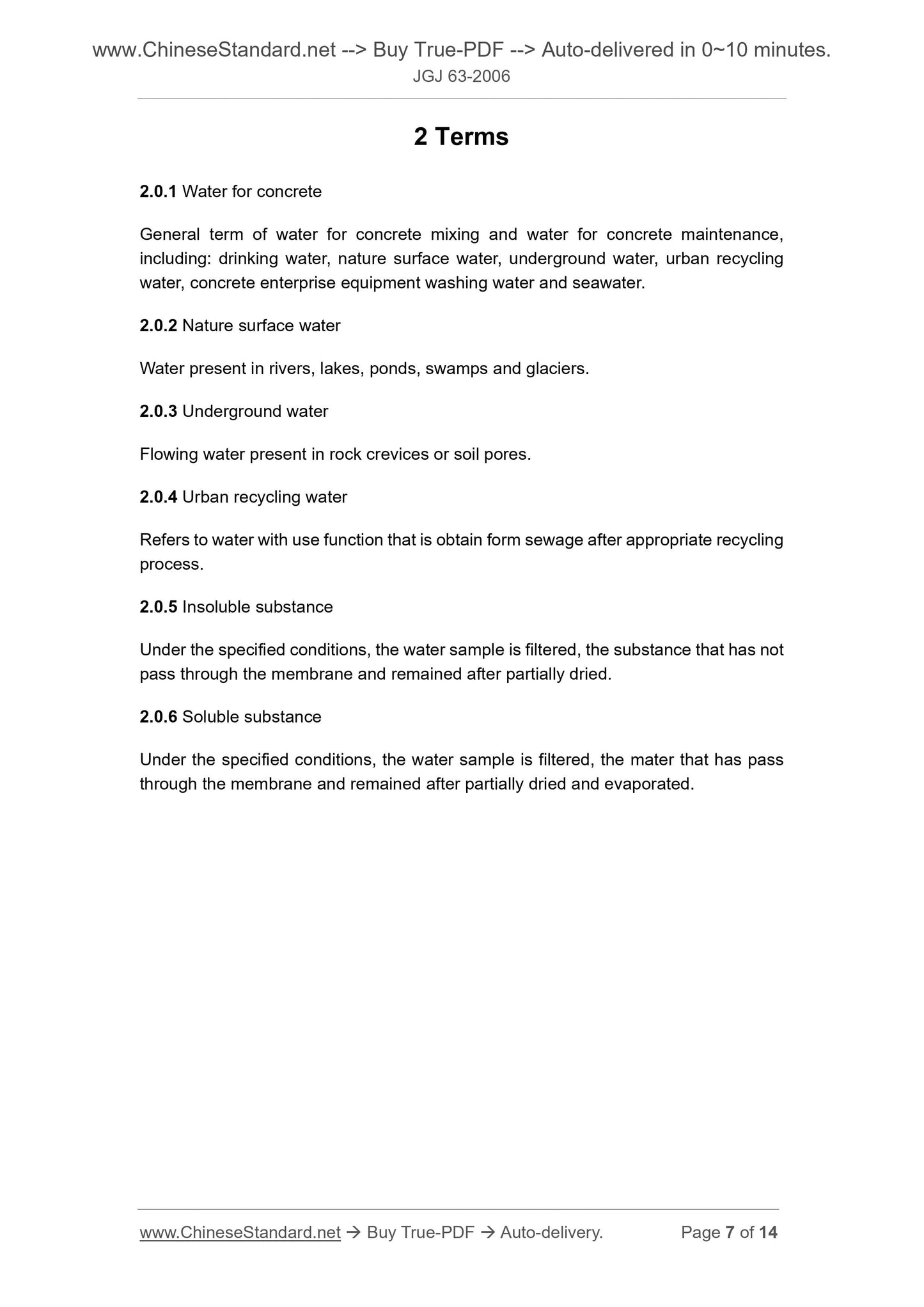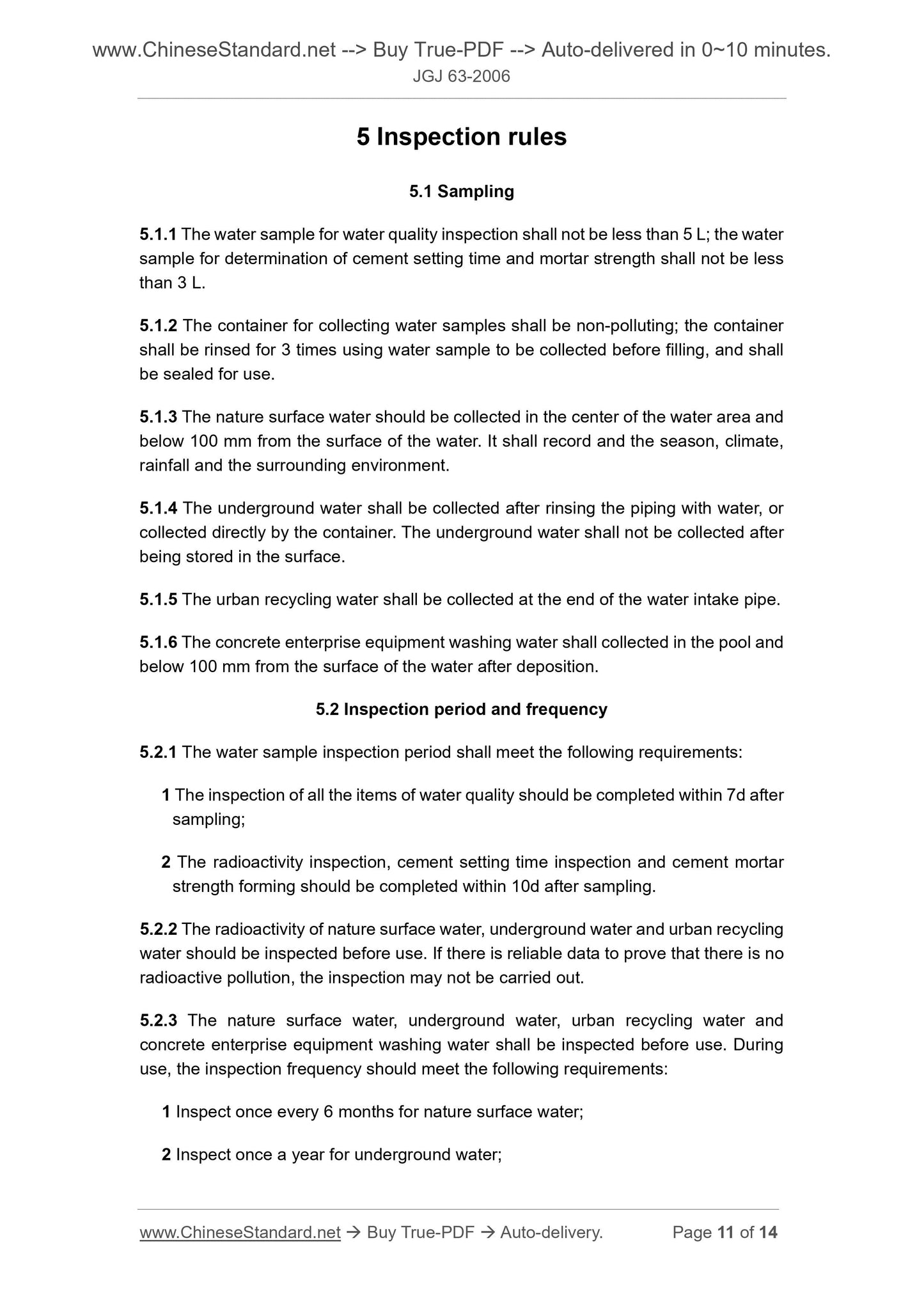1
/
von
6
PayPal, credit cards. Download editable-PDF and invoice in 1 second!
JGJ 63-2006 English PDF (JGJ63-2006)
JGJ 63-2006 English PDF (JGJ63-2006)
Normaler Preis
$145.00 USD
Normaler Preis
Verkaufspreis
$145.00 USD
Grundpreis
/
pro
Versand wird beim Checkout berechnet
Verfügbarkeit für Abholungen konnte nicht geladen werden
Delivery: 3 seconds. Download true-PDF + Invoice.
Get QUOTATION in 1-minute: Click JGJ 63-2006
Historical versions: JGJ 63-2006
Preview True-PDF (Reload/Scroll if blank)
JGJ 63-2006: Standard of water for concrete
JGJ 63-2006
JGJ
PROFESSIONAL STANDARD OF
THE PEOPLE’S REPUBLIC OF CHINA
UDC
Standard of water for concrete
ISSUED ON. JULY 25, 2006
IMPLEMENTED ON. DECEMBER 1, 2006
Issued by. Ministry of Construction of the people’s Republic of China
Foreword
According to the requirements of Document Jian Biao [2004] No. 66 issued by Ministry
of Construction (MOC), and after making extensive investigations and studies,
conscientiously summing up practical experiences, referring to relevant foreign
advanced standards, and basing on extensive solicitation of opinions, the standard
developing group has revised the original “Standard of water for concrete mixing” JGJ
63-89.
The main technical contents of this Standard are. 1. General; 2. Terms; 3. Technical
requirements; 4. Inspection methods; 5. Inspection rules; 6. Result evaluation.
The main contents revised are. 1. AMEND the standard name to “Standard of water
for concrete”, INCORPORATE water for concrete maintenance into this Standard; 2.
ADD the chapter of terms, CANCEL the chapter of classification; 3. INCORPORATE
urban recycling water into this Standard; 4. In the technical requirements for water
quality, the pH value of water for prestressed concrete is increased from 4.0 to 5.0,
and the pH value of water for reinforced concrete and plain concrete is increased from
4.0 to 4.5; the chloride content (in Cl-) in water for reinforced concrete is reduced from
1200 mg/L to 1000 mg/L; the chloride ion content in water for structural concrete with
a design service life of 100 years shall not exceed 500 mg/L; the sulfate (in SO42-) is
reduced from 2700 mg/L to 2000 mg/L; CANCEL the sulfide inspection items; ADD the
content of alkali content; 5. ADD the radioactivity inspection items; 6. DETERMINE the
cement mortar strength test as the only strength comparative test method; 7. All
inspection methods refer to national standards; 8. ADD the content of inspection
frequency.
The Ministry of Construction is responsible for the management and interpretation of
the mandatory provisions in this Standard, and the chief development organization is
responsible for the interpretation of specific technical content.
Chief development organization of this Standard. China Academy of Building
Research (Address. No. 30, North Third Ring East Road, Beijing; Zip code. 100013)
Participating organizations of this Standard. Jingcheng Zhongshui Brunch of Beijing
Drainage Group Co., Ltd., Shenzhen University, China National Environmental
Monitoring Centre, Yunnan Construction Engineering Concrete Co., Ltd., Shenzhen
Xingaojian Commodity Concrete Co., Ltd., Beijing Yushuchuang Component Factory,
Beijing Water Conservation Management Center, Guizhou Construction Science
Research and Design Institute, Building Materials Co., Ltd. of China Academy of Building
Research
Chief drafting staff of this Standard. Ding Wei, Leng Faguang, Huo Jian, Xing Feng,
Wang Qiang, Du Wei, Guo Huibin, Li Xincheng, Yang Yuqi, He Jianping, Ma Donghua,
Zhao Jicheng, Huang Lei, Wang Yujie, Lin Lixun.
Table of Contents
Foreword ... 4
1 General ... 6
2 Terms ... 7
3 Technical requirements ... 8
3.1 Water for concrete mixing ... 8
3.2 Water for concrete maintenance ... 9
4 Inspection methods ... 10
5 Inspection rules ... 11
5.1 Sampling ... 11
5.2 Inspection period and frequency ... 11
6 Result evaluation ... 13
Wording of this Standard ... 14
1 General
1.0.1 In order to ensure the quality of water for concrete, and to make concrete
performance meet the technical requirements, this Standard is developed.
1.0.2 This Standard applies to water for concrete of industrial and civil buildings and
general structures.
1.0.3 In addition to complying with this Standard, water for concrete shall also comply
with the provisions of existing national standards.
2 Terms
2.0.1 Water for concrete
General term of water for concrete mixing and water for concrete maintenance,
including. drinking water, nature surface water, underground water, urban recycling
water, concrete enterprise equipment washing water and seawater.
2.0.2 Nature surface water
Water present in rivers, lakes, ponds, swamps and glaciers.
2.0.3 Underground water
Flowing water present in rock crevices or soil pores.
2.0.4 Urban recycling water
Refers to water with use function that is obtain form sewage after appropriate recycling
process.
2.0.5 Insoluble substance
Under the specified conditions, the water sample is filtered, the substance that has not
pass through the membrane and remained after partially dried.
2.0.6 Soluble substance
Under the specified conditions, the water sample is filtered, the mater that has pass
through the membrane and remained after partially dried and evaporated.
5 Inspection rules
5.1 Sampling
5.1.1 The water sample for water quality inspection shall not be less than 5 L; the water
sample for determination of cement setting time and mortar strength shall not be less
than 3 L.
5.1.2 The container for collecting water samples shall be non-polluting; the container
shall be rinsed for 3 times using water sample to be collected before filling, and shall
be sealed for use.
5.1.3 The nature surface water should be collected in the center of the water area and
below 100 mm from the surface of the water. It shall record and the season, climate,
rainfall and the surrounding environment.
5.1.4 The underground water shall be collected after rinsing the piping with water, or
collected directly by the container. The underground water shall not be collected after
being stored in the surface.
5.1.5 The urban recycling water shall be collected at the end of the water intake pipe.
5.1.6 The concrete enterprise equipment washing water shall collected in the pool and
below 100 mm from the surface of the water after deposition.
5.2 Inspection period and frequency
5.2.1 The water sample inspection period shall meet the following requirements.
1 The inspection of all the items of water quality should be completed within 7d after
sampling;
2 The radioactivity inspection, cement setting time inspection and cement mortar
strength forming should be completed within 10d after sampling.
5.2.2 The radioactivity of nature surface water, underground water and urban recycling
water should be inspected before use. If there is reliable data to prove that there is no
radioactive pollution, the inspection may not be carried out.
5.2.3 The nature surface water, underground water, urban recycling water and
concrete enterprise equipment washing water shall be inspected before use. During
use, the inspection frequency should meet the following requirements.
1 Inspect once every 6 months for nature surface water;
2 Inspect once a year for underground water;
Get QUOTATION in 1-minute: Click JGJ 63-2006
Historical versions: JGJ 63-2006
Preview True-PDF (Reload/Scroll if blank)
JGJ 63-2006: Standard of water for concrete
JGJ 63-2006
JGJ
PROFESSIONAL STANDARD OF
THE PEOPLE’S REPUBLIC OF CHINA
UDC
Standard of water for concrete
ISSUED ON. JULY 25, 2006
IMPLEMENTED ON. DECEMBER 1, 2006
Issued by. Ministry of Construction of the people’s Republic of China
Foreword
According to the requirements of Document Jian Biao [2004] No. 66 issued by Ministry
of Construction (MOC), and after making extensive investigations and studies,
conscientiously summing up practical experiences, referring to relevant foreign
advanced standards, and basing on extensive solicitation of opinions, the standard
developing group has revised the original “Standard of water for concrete mixing” JGJ
63-89.
The main technical contents of this Standard are. 1. General; 2. Terms; 3. Technical
requirements; 4. Inspection methods; 5. Inspection rules; 6. Result evaluation.
The main contents revised are. 1. AMEND the standard name to “Standard of water
for concrete”, INCORPORATE water for concrete maintenance into this Standard; 2.
ADD the chapter of terms, CANCEL the chapter of classification; 3. INCORPORATE
urban recycling water into this Standard; 4. In the technical requirements for water
quality, the pH value of water for prestressed concrete is increased from 4.0 to 5.0,
and the pH value of water for reinforced concrete and plain concrete is increased from
4.0 to 4.5; the chloride content (in Cl-) in water for reinforced concrete is reduced from
1200 mg/L to 1000 mg/L; the chloride ion content in water for structural concrete with
a design service life of 100 years shall not exceed 500 mg/L; the sulfate (in SO42-) is
reduced from 2700 mg/L to 2000 mg/L; CANCEL the sulfide inspection items; ADD the
content of alkali content; 5. ADD the radioactivity inspection items; 6. DETERMINE the
cement mortar strength test as the only strength comparative test method; 7. All
inspection methods refer to national standards; 8. ADD the content of inspection
frequency.
The Ministry of Construction is responsible for the management and interpretation of
the mandatory provisions in this Standard, and the chief development organization is
responsible for the interpretation of specific technical content.
Chief development organization of this Standard. China Academy of Building
Research (Address. No. 30, North Third Ring East Road, Beijing; Zip code. 100013)
Participating organizations of this Standard. Jingcheng Zhongshui Brunch of Beijing
Drainage Group Co., Ltd., Shenzhen University, China National Environmental
Monitoring Centre, Yunnan Construction Engineering Concrete Co., Ltd., Shenzhen
Xingaojian Commodity Concrete Co., Ltd., Beijing Yushuchuang Component Factory,
Beijing Water Conservation Management Center, Guizhou Construction Science
Research and Design Institute, Building Materials Co., Ltd. of China Academy of Building
Research
Chief drafting staff of this Standard. Ding Wei, Leng Faguang, Huo Jian, Xing Feng,
Wang Qiang, Du Wei, Guo Huibin, Li Xincheng, Yang Yuqi, He Jianping, Ma Donghua,
Zhao Jicheng, Huang Lei, Wang Yujie, Lin Lixun.
Table of Contents
Foreword ... 4
1 General ... 6
2 Terms ... 7
3 Technical requirements ... 8
3.1 Water for concrete mixing ... 8
3.2 Water for concrete maintenance ... 9
4 Inspection methods ... 10
5 Inspection rules ... 11
5.1 Sampling ... 11
5.2 Inspection period and frequency ... 11
6 Result evaluation ... 13
Wording of this Standard ... 14
1 General
1.0.1 In order to ensure the quality of water for concrete, and to make concrete
performance meet the technical requirements, this Standard is developed.
1.0.2 This Standard applies to water for concrete of industrial and civil buildings and
general structures.
1.0.3 In addition to complying with this Standard, water for concrete shall also comply
with the provisions of existing national standards.
2 Terms
2.0.1 Water for concrete
General term of water for concrete mixing and water for concrete maintenance,
including. drinking water, nature surface water, underground water, urban recycling
water, concrete enterprise equipment washing water and seawater.
2.0.2 Nature surface water
Water present in rivers, lakes, ponds, swamps and glaciers.
2.0.3 Underground water
Flowing water present in rock crevices or soil pores.
2.0.4 Urban recycling water
Refers to water with use function that is obtain form sewage after appropriate recycling
process.
2.0.5 Insoluble substance
Under the specified conditions, the water sample is filtered, the substance that has not
pass through the membrane and remained after partially dried.
2.0.6 Soluble substance
Under the specified conditions, the water sample is filtered, the mater that has pass
through the membrane and remained after partially dried and evaporated.
5 Inspection rules
5.1 Sampling
5.1.1 The water sample for water quality inspection shall not be less than 5 L; the water
sample for determination of cement setting time and mortar strength shall not be less
than 3 L.
5.1.2 The container for collecting water samples shall be non-polluting; the container
shall be rinsed for 3 times using water sample to be collected before filling, and shall
be sealed for use.
5.1.3 The nature surface water should be collected in the center of the water area and
below 100 mm from the surface of the water. It shall record and the season, climate,
rainfall and the surrounding environment.
5.1.4 The underground water shall be collected after rinsing the piping with water, or
collected directly by the container. The underground water shall not be collected after
being stored in the surface.
5.1.5 The urban recycling water shall be collected at the end of the water intake pipe.
5.1.6 The concrete enterprise equipment washing water shall collected in the pool and
below 100 mm from the surface of the water after deposition.
5.2 Inspection period and frequency
5.2.1 The water sample inspection period shall meet the following requirements.
1 The inspection of all the items of water quality should be completed within 7d after
sampling;
2 The radioactivity inspection, cement setting time inspection and cement mortar
strength forming should be completed within 10d after sampling.
5.2.2 The radioactivity of nature surface water, underground water and urban recycling
water should be inspected before use. If there is reliable data to prove that there is no
radioactive pollution, the inspection may not be carried out.
5.2.3 The nature surface water, underground water, urban recycling water and
concrete enterprise equipment washing water shall be inspected before use. During
use, the inspection frequency should meet the following requirements.
1 Inspect once every 6 months for nature surface water;
2 Inspect once a year for underground water;
Share
